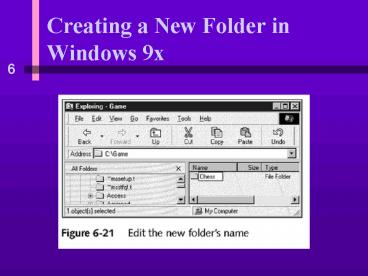Creating a New Folder in Windows 9x - PowerPoint PPT Presentation
1 / 34
Title:
Creating a New Folder in Windows 9x
Description:
Routine maintenance: defragment the hard drive. DOS. DOS 6 DEFRAG or a ... Don't optimize or defragment the hard drive using software that does not know ... – PowerPoint PPT presentation
Number of Views:44
Avg rating:3.0/5.0
Title: Creating a New Folder in Windows 9x
1
Creating a New Folder in Windows 9x
2
Deleting a Folder in Windows 9x
3
4
Optimizing a Hard Drive
- Fragmentation
- Cross-linked and lost clusters
- Disk compression
- Disk caching
5
Fragmentation
- Distribution of data files in noncontiguous
clusters increases data access time - Routine maintenance defragment the hard drive
- DOS
- DOS 6 DEFRAG or a utility software package
- Windows 98
- Defragmenter utility
6
Windows 98 Defragmenter Utility
7
Disk Defragmenter Results
8
Cross-linked and Lost Clusters
- Cross-linked
- More than one file points to them
- Lost
- No file in the FAT points to them
- To repair use ScanDisk utility in either DOS or
Windows 9x
9
Cross-linked and Lost Clusters
10
SCANDISK Command for DOS
11
ScanDisk
12
ScanDisk
13
Disk Compression
- Compresses data on a hard drive to allow more
data to be written to the drive - Works by
- Storing data on the hard drive in one big file
and managing the writing of data and programs to
that file - Rewriting data in files in a mathematically coded
format that uses less space
14
Disk Compression in DOS and Windows 3.x
- Uses a device driver loaded in the CONFIG.SYS
file - PKZIP
15
Parts of a Compressed Drive
- Host drive
- Compressed volume file (CVF)
16
Disk Compression in Windows 9x
- Uses DriveSpace to
- Assign different drive letter to hard drive,
(e.g., H) - Compress entire contents of hard drive into a
single file on drive H - Set up the drive so that Windows 9x and other
applications view this compressed file as drive C - Configure Windows 9x so that each time it boots,
DriveSpace driver will load and manage the
compressed drive
17
Disk Compression in Windows 9x
18
Disk Compression in Windows 9x
19
Disk Compression in Windows 9x
20
Disk Compression in Windows 9x
21
Disk Compression in Windows 9x
22
Disk Compression in Windows 9x
23
Disk Caching
- A method whereby recently retrieved data and
adjacent data are read into memory in advance,
anticipating the next CPU request
24
Disk Caching
25
Hardware Cache or Software Cache
- Hardware cache
- A disk cache that is contained in RAM chips built
right on the disk controller - Software cache
- Cache controlled by software whereby the cache is
stored in RAM
26
Hardware Cache or Software Cache
- Hardware cache disadvantages
- Slower than a software cache
- A permanent part of the hard drive controller
- Software cache
- Disadvantage
- Uses RAM for both the cache program itself and
the data being cached RAM is used that might
otherwise be used for applications software and
its data - Advantage
- Faster than hardware cache
27
Disk Cache in DOS and Windows 3.x
- SMARTDrive
- A 16-bit real mode software cache utility that
comes with DOS and Windows 3.x - Can be executed as a TSR from the AUTOEXEC.BAT
file - Other packages
- Norton Cache
- Mace Cache
- Super PC-Kwik Cache
28
VCACHE in Windows 9x
- A built-in Windows 9x 32-bit software cache that
doesnt take up conventional memory space or
upper memory space, as SmartDrive does
29
DOS Buffers
- An area in memory where data waiting to be read
or written is temporarily stored
30
Using DOS under Windows 9x to Manage a Hard Drive
- CAUTION Using some DOS commands on a hard drive
that uses Windows 9x as the OS may cause damage
to a hard drives file structure
31
DOS Commands to Avoid with Windows 9x
- Dont use disk utility software that does not
know about VFAT, long filenames or FAT32 - Dont use FDISK, FORMAT C, SYS C, or CHKDSK
while in a DOS session - Dont optimize or defragment the hard drive using
software that does not know about long filenames
continued
32
DOS Commands to Avoid with Windows 9x
- Dont run hard drive cache programs unless
written especially for Windows 95 or Windows 98 - Dont use older DOS backup programs (BACKUP,
MSBACKUP)
33
Removable Drives
- High-capacity drives, such as Zip or Jaz drives,
that have disks that can be removed like floppy
disks
34
Chapter Summary
- Hard drive similarities to floppy drives
- Has a file allocation table (FAT) and a root
directory - Stores data on tracks that are divided into
sectors, each of which contains 512 bytes - Methods of organizing and formatting data
- Managing a healthy, previously installed hard
drive - Hard drive technologies































